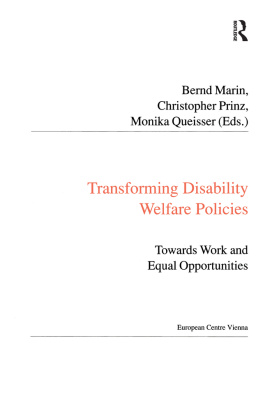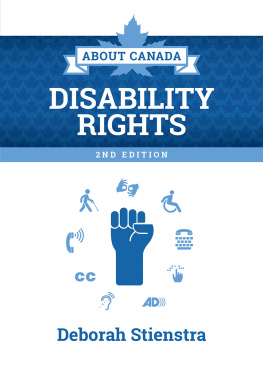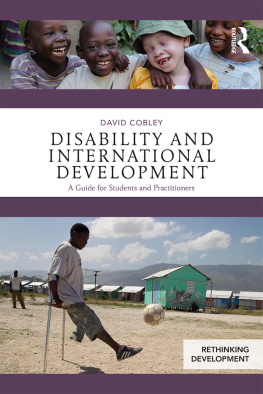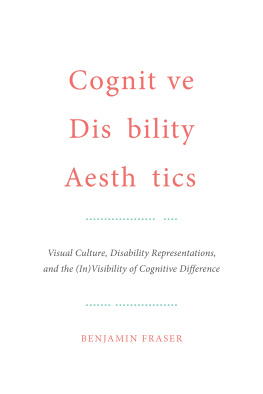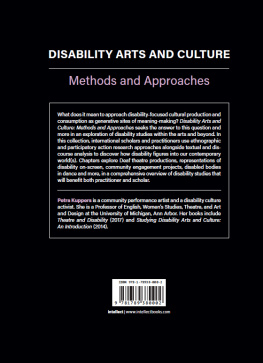CLAIMING DISABILITY
KNOWLEDGE AND IDENTITY
SIMI LINTON
FOREWARD BY MICHAEL BRUB
NEW YORK UNIVERSITY PRESS
New York and London
1998 by New York University
All rights reserved
Library of Congress Cataloging-in-Publication Data
Linton, Simi, 1947
Claiming disability : knowledge and identity / Simi Linton.
p. cm. (Cultural front (Series))
Includes bibliographical references and index.
ISBN 0-8147-5133-4 (cloth : acid-free paper). ISBN
0-8147-5134-2 (paper : acid-free paper)
1. Disability studies. 2. Sociology of disability. I. Title.
II. Series.
HV1568.2.L55 1998
305.90816 dc21 97-21218
CIP
New York University Press books are printed on acid-free paper, and their binding materials are chosen for strength and durability.
Manufactured in the United States of America
10 9 8 7 6 5
FOREWORD
PRESSING THE CLAIM
In the years and decades to come, inside academe and outside, claiming disability is sure to become one of the most politically sensitive endeavors a body can undertake. Thats partly because the U.S. population will be gradually aging, and with age comes a certain vulnerability to the fleshy frailties of body and mind; but its also because disability will have so multifarious and indeterminate a meaning in U.S. culture, regardless of how old our average citizen may be. For disability is the most labile and pliable of categories: it names thousands of human conditions and varieties of impairment, from the slight to the severe, from imperceptible physical incapacity to inexplicable developmental delay. It is a category whose constituency is contingency itself. Any of us who identify as nondisabled must know that our self-designation is inevitably temporary, and that a car crash, a virus, a degenerative genetic disease, or a precedent-setting legal decision could change our status in ways over which we have no control whatsoever. If it is obvious why most nondisabled people resist this line of thinking, it should be equally obvious why that resistance must somehow be overcome.
Thus the definition of disability, like the definition of illness, is inevitably a matter of social debate and social construction: as Simi Linton shows time and again in these pages, humans have defined normal in as many ways as there are human cultures. In the wake of the Americans with Disabilities Act of 1990, claiming disability will involve taking up a contested place in an intricate sociolegal apparatus, and consequently, few social imperatives will be as pressing as our need to enrich and enhance our cultures collective understanding of disabilityin its causes, its effects, its representations, and its ramifications. What Linton shows us in Claiming Disability, crucially, is that universities will not be able to meet that pressing need if disability remains a subject confined to the applied fields such as social work or rehabilitation; in other words, if disability is not understood in terms of its complex, overdetermined and sometimes tenuous relations to identity, it will not be sufficiently incorporated into the curriculum of the liberal arts or into the definition of what constitutes the humanities. And if we do not imagine disability as a broad, general subject that shapes the humanities, it is all the less likely that we will manage to imagine disability as a broad, general subject that shapes public life and public policy.
But I should back up for a moment and confess that I did not always think this way. (Indeed, I hope my own change of mind will serve as evidence of the cogency of Lintons argument.) Once upon a time, I did not see what disability studies might have to do with me. I had what I thought was a liberal, open-minded attitude toward mental and physical disabilities; I was kind to people who used wheelchairs (and mindful of whether they did or didnt welcome my physical assistance with doors) and respectful of all persons regardless of their mental abilities, but when it came to whether disability should be a major academic subject, I just couldnt see the point of one more additive studies program in the curriculum. In the early 1990s, for instance, I read newspaper reports of a controversy at Hunter College over the status of disability studies. Apparently there had been some dispute over whether disability should be included in the subjects approved for general education courses; the advocates of disability studies had lost the battle, and their protests were depicted, in the argot of that bygone era, as one more instance of the tide of political correctness sweeping through the groves of academe. Of course, even then I knew better than to believe what I read in the papers. But though I was properly outraged at the way the New Right was trying to scandalize womens studies, African American studies, and area studies of all kinds, I honestly didnt think that disability studies merited the same kinds of claimsor the same kind of defense.
As best I can recall at this distance, my reasoning depended on a calculation of centers and marginsa calculation that I somehow exempted from the deconstruction I had been trained to apply to all such calculations. The calculation ran something like this: general education should involve broad introductory courses in history, literature, science, philosophy, and political theory. Perhaps after those course requirements are fulfilled, students can choose elective courses in specializations like disability studies, but disability studies is by definition not general; it is specific only to disability. Look at the field of education, for instance: general education is general, and special education is well... special, is it not?
As it turns out, of course, Simi Linton herself was a central player in the controversy at Hunter; this book is (in part) a result of that curricular dispute over the centrality of disability studies. And, more importantly, Simi Linton was right, and together with a handful of scholars in this small but growing field, she has convinced me that disability studies is no more an optional additive to the liberal arts than is the study of gender or race. Part of the reason I changed my mind so dramatically has nothing to do with anything Ive read; when I became the father of a child with Down syndrome, I realized immediately and viscerally that disability can happen to anyoneincluding someone very close to you, and including you, too. But experience is not my only teacher: reading scholars like Rosemarie Garland Thomson and Lennard Davis, essayists like Nancy Mairs and Leah Hager Cohen, I began to encounter and understand various constituencies within the disability community from Down syndrome associations to deaf culture.
Today, when I try to account for my relation to disability studies as a nondisabled scholar, I am not merely appalled but intrigued by my former conviction that disability studies is not sufficiently central to the liberal arts. I now believe that my resistance to disability studies is of a piece with a larger and more insidious cultural form of resistance whereby nondisabled people find it difficult or undesirable to imagine that disability law is central to civil rights legislation. Heres what I mean. Just as I was liberal with regard to disability, so was I liberal with regard to gender and race: I supported (and I continue to support) equal pay for equal work and initiatives such as affirmative action


